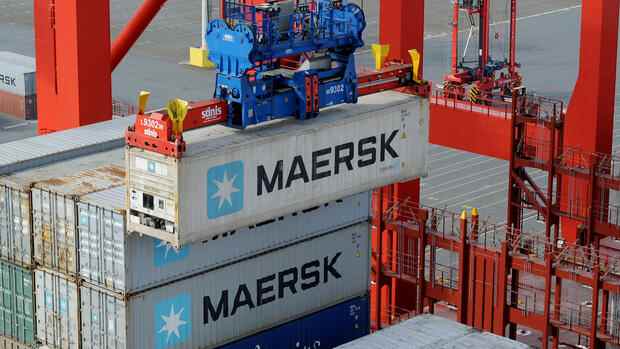Dusseldorf The US Department of Justice, with the support of the Federal Cartel Office, stops the sale of a Danish sea container manufacturer to China. The reason given by the Americans: the almost one billion dollar acquisition of the little-known company MCI based in Tinglev would have allowed the Chinese “too much control over a strategic business”.
The Federal Cartel Office in Bonn, which said it had also expressed “considerable competition law concerns” about the deal, then reported on Friday that the companies involved had withdrawn the registration. The German competition authorities were involved in the “intensive, global investigations”. The Copenhagen-based shipping group Maersk was on the sales side, and the Shenzhen-based China International Marine Containers Group (CIMC) had applied to buy the company, which was founded in 1991 and has 2,300 employees.
The dismissal of the antitrust lawyers is an example of a new approach in economic relations with China. So far, takeover bans have generally hit producers from the high-tech sector. In 2018, for example, the Federal Ministry of Economics prohibited the sale of the Lower Rhine radio technician IMST to Chinese interested parties. Berlin also refused the Westphalian machine tool manufacturer Leifeld Metal Spinning a sale to China.
The ventilator company Hayer Medical from Bad Ems was last hit in April of this year. The federal government saw the intended sale as endangering public safety in Germany – especially after the experiences from the corona pandemic.
Top jobs of the day
Find the best jobs now and
be notified by email.
The fact that bans on takeovers are now also affecting a manufacturer of simple steel boxes for seafaring comes as a surprise to some in the industry. “We firmly assumed that the takeover would go through without further ado,” said a shipping company in Hamburg.
Baerbock: “More toughness in dealing with authoritarian states like China”
Maersk should have been warned at the latest since a statement by Federal Foreign Minister Annalena Baerbock (Greens). In the Bundestag Committee on Human Rights at the beginning of June, she vehemently advocated “more toughness in dealing with authoritarian states like China”. With regard to Germany’s close trade relations with China, she reported that the Federal Foreign Office is currently working on a China strategy. The aim is to “create more distance and reduce economic dependencies”.
But while the US Department of Justice openly rejected the sale of the Maersk subsidiary that was arranged last September for “strategic reasons” – after all, MCI maintains its research facilities in Denmark – the Bonn competition authority argued in its statement strictly with antitrust concerns.
“By taking over Maersk Container Industry, the China International Marine Containers Group would have further expanded its strong position to a global market share of 60 to 70 percent,” said the President of the Cartel Office, Andreas Mundt.
>> Read about this: Shipping companies invest billions in acquisitions from the logistics industry
In addition, the market is very limited. Both the prospective buyer and the Danish manufacturer MCI, which produces and sells its containers under the “Star Cool” brand, have specialized in the manufacture of refrigerated containers and refrigeration units.
According to the US Department of Justice, around 90 percent of global refrigerated container production would have been in Chinese hands as a result of the takeover. One of them, the Chinese competitor Guangdong Fuwa Engineering, only has a small market position and relatively small production capacities. However, the other provider, the Chinese Dong Fang, belongs to the Chinese state shipping company Cosco.
European shipping companies such as Hapag-Lloyd, MSC or CMA CGM would become dependent on their largest Chinese competitor when purchasing their containers, explained competition watchdog Mundt.
There have also been corporate and personal connections between the rejected prospective buyer CIMC and Cosco for several decades until recently. Cosco, which emerged from a shipping company merger ordered by Beijing, is the fourth largest container shipping company in the world, ahead of Hapag-Lloyd.
Cosco deal in Hamburg is becoming more uncertain
Maersk was disappointed with the decision of the antitrust authorities. “It is unfortunate that despite the efforts of all parties involved, the transaction will not go ahead,” said Patrick Any, Chief Financial Officer at AP Moller-Maersk. They will now examine the “best structural setup for MCI” to ensure the long-term development of the company.
The planned entry of the Chinese shipping company Cosco at the Hamburger Container-Hafenterminal Tollerort (CTT) could still burst in view of the current developments. The Chinese had already agreed on a 35 percent stake with Hamburger Hafen und Logistik AG (HHLA) in September 2021. A few days ago, however, unconfirmed reports appeared in the Hanseatic city, according to which Federal Minister of Economics Robert Habeck (Greens) wanted to prohibit entry.
The draft of the Federal Cabinet for the meeting stated in the official wording: “Prohibition of the acquisition of a stake in a domestic company by a non-EU acquirer in the cross-sector investment review process”. However, the Federal Ministry of Economics announced a few days ago that the investment review process was still ongoing.
The terminal operator HHLA, which is listed on the stock exchange but in which the Hanseatic city holds a majority stake, had promised itself that the Chinese shipping company would take Cosco to maximum capacity utilization of the Tollerort terminal in the future. After all, as a co-owner, the Chinese shipping company would be extremely interested in a decent operation. The Hamburg logistics company recently said that approval is still expected.
More: Port of Hamburg: Habeck is critical of the entry of Chinese state-owned companies
